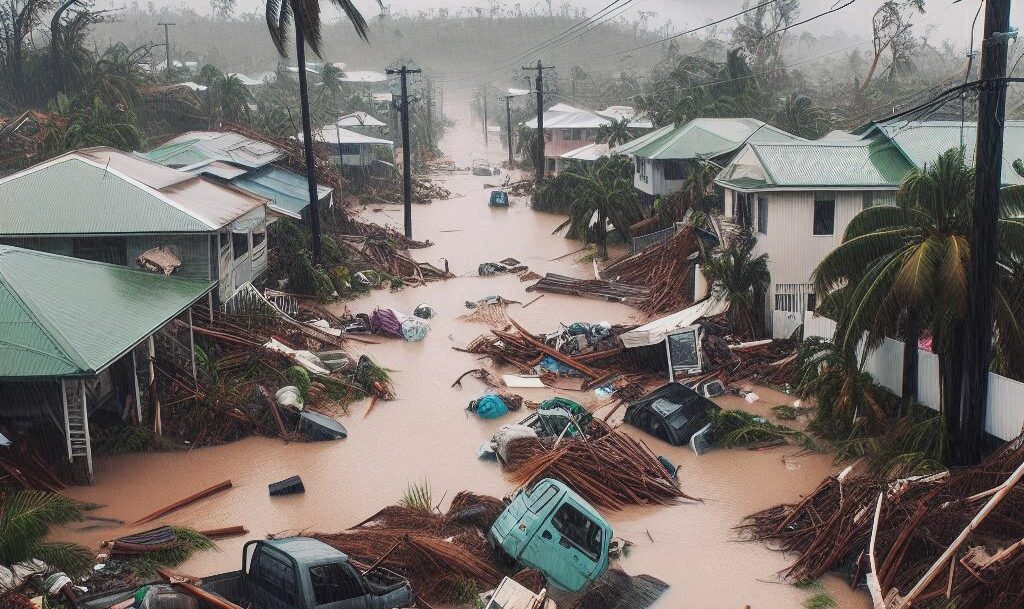
‘’The earth has a fever‘’
Urgent need for action
With prayer intentions for the month of September 2024 dedicated to prayer and action for Creation, the Pope invites everyone to make a personal commitment to safeguard the planet. Through a video message entitled: ‘’The Earth has a fever, let us listen with the heart to its cry‘’ he reiterates that the environmental crisis caused by man ‘’requires not only ecological, but also social, economic and political responses.
Many devastated regions
Natural disasters and floods seem to be intensifying, affecting many countries around the world. In 2024, many faced floods, inundations, droughts, fires and disastrous cyclones that caused loss of life, economic damage, displacement…
This situation is a wake-up call and highlights the need for global and regional strategies for emergency prevention and management.
The year 2024 is far from quiet.
Overview of these last few months
Rising global temperatures, linked to climate change, are intensifying extreme phenomena such as floods, earthquakes, fires…
In Europe, the Czech Republic, Hungary, Romania, Slovakia, Poland, Austria, Germany, Italy, etc. are affected.
Very strong storms, such as Cyclone Boris, hit both Central and Eastern Europe hard, causing severe damage, deaths and missing persons. Torrential rain and strong winds battered many regions with great force. Water flooded roads, cars and houses. The storm caused massive power outages and severe damage to the transport network.
In Italy, tornadoes and tornadoes are causing shipwrecks and flooding in Calabria, Campania, Sicily, Tuscany, Lazio, etc.
In Africa, entire regions devastated
Niger, Mali, Tchad, Nigeria, Libéria, Sudan, Mozambique, DR Congo, etc., Africa is also affected. According to one of UNICEF’s latest assessments, the situation is serious and worrying: more than 900 dead and 3.5 million people affected.
Sudan has suffered massive flooding, with the Nile River reaching record levels forcing communities to evacuate and causing the destruction of thousands of homes. Access to drinking water became an urgent problem, with the risk of disease.
North Africa was not spared. Torrential rains accompanied by violent flooding caused dozens of deaths and several people to go missing in early September in southern Morocco.
And while others are drowning under water, in some regions of Zimbabwe people are digging up river beds to find water. One of the worst droughts in living memory is sweeping across southern Africa, leaving nearly 70 million people without adequate water or food. Rivers that flow all year round are currently only beige sand as far as the eye can see.
In Asia, Typhoon Yagi in action
This September, Vietnam, Myanmar, Laos and Thailand were devastated by Typhoon Yagiv, considered to be the most powerful super typhoon of 2024 in the Pacific Northwest and recorded as one of the strongest in the last 30 years in the East Sea.
UNICEF estimates that more than 500 people have died, including 226 in Myanmar, and thousands more have been displaced in the region. Thousands are also injured. The floods caused extensive damage, destroying houses, hospitals and schools, as well as bridges and thousands of hectares of paddy fields and other crops. Lives were also lost.
In America fires and floods
California is hit by devastating fires fuelled by drought and high temperatures. These have damaged infrastructure, caused mass evacuations and worsened air quality.
Even in the Brazilian Amazon, devastating fires and historic droughts are noted. The Negro River reached its lowest level in over 120 years, while the Panama Canal saw ship traffic restricted due to the lack of rain.
In Mexico, Storm John turned into a hurricane and hit the region. Floods and dangerous storm surges are expected.
On the Australian continent
At the beginning of the year, the country was overwhelmed by forest fires. Thousands of hectares of forest were destroyed, with a devastating impact on local biodiversity and wildlife. The flames have also forced the evacuation of entire cities, endangering thousands of lives. Although there are no fires now, it must be emphasised that the frequency and intensity of climatic events is constantly increasing on this continent.
Worldwide impact
All affected. The list would be much longer and makes one understand the urgent words of Pope Francis: ‘’the Earth has a fever, let us listen with the heart to its cry‘’.
In recent years, the world has witnessed an increasing frequency and intensity of natural disasters. Events such as earthquakes, cyclones, hurricanes, fires and floods are hitting different regions hard, with serious consequences for millions of people: rising sea levels, disappearing coral reefs, coastal cities may disappear. According to experts, the thawing of the ground will lead to a ‘dramatic’ increase in forest fires in the Arctic (Western Siberia and Canada), releasing large quantities of greenhouse gases in the process. Add to this the human, economic and social consequences…
Scientists have defined nine ‘planetary limits’ that humanity should not exceed if it wants to remain in a ‘safe operating zone’. They warn that the world will soon exceed the sixth…
Preparing the future for the next generations
The fight against climate change must be at the centre of global policies, as extreme weather events such as floods are set to become more frequent unless effective action is taken.
The natural disasters of 2024 are a clear warning sign and demonstrate the urgency of closer international cooperation to address the root causes of these events.
Prevention and mitigation efforts must be intensified, with investments in resilient infrastructure and early warning systems.
At the same time, the international community must remain ready to provide rapid and effective humanitarian aid, minimising the suffering of affected populations.
Without concerted and responsible action, the world will continue to bear the growing brunt of devastating natural disasters. The earth has a fever.
Source
- Per il grido della Terra – Il Video del Papa 9 – Settembre 2024 (youtube.com)
- Unprecedented floods: Urgent need to protect children – UNICEF
- spazio+spadoni
Images
- Image digitally created by spazio+spadoni
